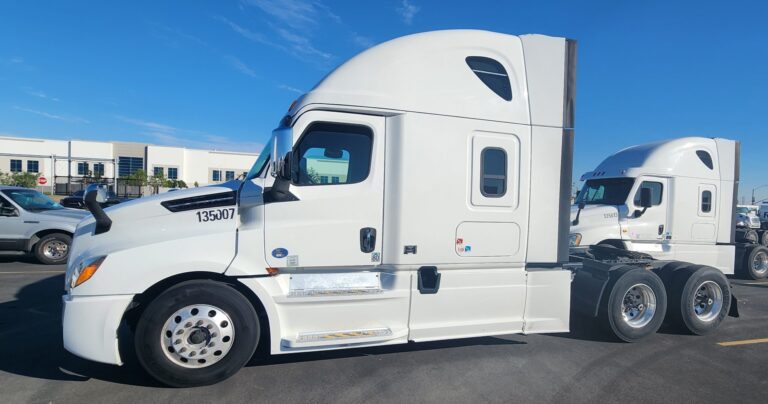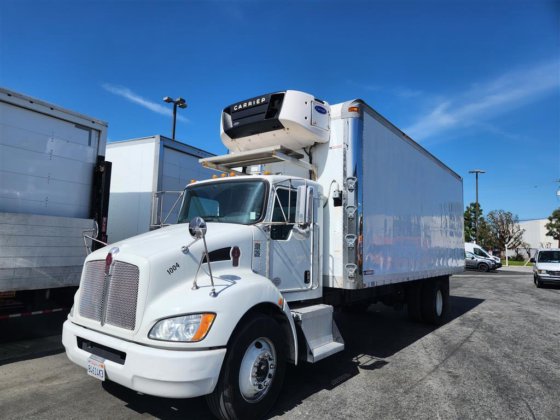Swift Transportation Owner Operator Pay: A Comprehensive Guide
Swift Transportation Owner Operator Pay: A Comprehensive Guide cars.truckstrend.com
The open road calls to many, but for the entrepreneurial spirit within the trucking industry, the call often leads to the owner-operator model. Swift Transportation, one of North America’s largest and most diversified trucking companies, offers a significant opportunity for independent contractors looking to leverage their own equipment and business acumen. Understanding Swift Transportation Owner Operator Pay is crucial for anyone considering this path, as it’s a complex equation involving revenue, expenses, and strategic decision-making.
This comprehensive guide will delve deep into the intricacies of being an owner-operator with Swift, exploring the pay structures, the factors influencing earnings, the associated costs, and practical advice to maximize profitability. By the end, you’ll have a clearer picture of what it means to run your own business under the Swift banner.
Swift Transportation Owner Operator Pay: A Comprehensive Guide
Understanding the Owner Operator Model at Swift
Becoming an owner-operator with Swift Transportation means you operate as an independent contractor, not an employee. You own or lease your truck and are responsible for its maintenance, insurance, and operating costs. In return, Swift provides the freight, dispatching services, and various support programs designed to help you succeed. This model offers greater independence and the potential for higher earnings compared to company driving, but it also comes with increased financial responsibility and risk.
Swift’s vast network and diverse freight options (dry van, refrigerated, flatbed, intermodal, etc.) mean owner-operators can often find consistent work across various lanes. This stability is a significant draw, especially for those new to the owner-operator lifestyle, as it mitigates some of the challenges of finding consistent loads independently.
Swift’s Pay Structure for Owner Operators
Swift’s owner-operator pay structure is designed to compensate for mileage, accessorial services, and to help mitigate fluctuating fuel costs. While specific rates can vary based on contract terms, division, and market conditions, the core components typically include:
- Linehaul Pay (Per-Mile Rate): This is the primary source of income, paid per mile driven with loaded freight. The rate per mile can vary significantly based on:
- Division: Dry van, reefer, flatbed, dedicated, etc., each may have different base rates.
- Lane: Rates often differ for specific routes (e.g., long-haul vs. regional, high-demand vs. low-demand areas).
- Freight Type: Specialized freight or hazmat loads may command higher rates.
- Negotiation: While less common for standard O/O agreements, some specialized contracts might allow for negotiation.

- Fuel Surcharge (FSC): This is a critical component designed to offset the volatility of fuel prices. Swift typically pays a separate fuel surcharge based on the Department of Energy (DOE) national average diesel price. It’s usually calculated as cents per mile, adjusting weekly or monthly based on the DOE average. A robust FSC ensures that as fuel prices rise, your effective per-mile rate increases, protecting your profitability.
- Accessorial Pay: These are payments for services beyond standard linehaul miles. They can significantly boost an owner-operator’s gross income. Common accessorial pays include:
- Detention Pay: Compensation for time spent waiting at a shipper or receiver beyond a specified grace period (e.g., 2-3 hours).
- Layover Pay: Compensation for being delayed overnight, preventing you from reaching your next destination or picking up another load.
- Stop-Off Pay: Payment for each additional stop required on a multi-stop load.
- Loading/Unloading Pay: If the driver is required to assist with loading or unloading.
- Tarping Pay: For flatbed owner-operators who need to secure and tarp loads.
- Hazmat Pay: An additional premium for transporting hazardous materials.
- Reefer Plug-in/Washout Pay: For refrigerated units, covering costs associated with maintaining temperature or cleaning the trailer.


Understanding and meticulously tracking all accessorial services is vital, as they can add thousands of dollars to your annual income.
Key Factors Influencing Owner Operator Earnings
While Swift provides the framework, an owner-operator’s actual take-home pay is influenced by several factors, many of which are within their control:
- Mileage Driven: The more loaded miles you safely and efficiently drive, the higher your gross revenue. This is directly tied to your efficiency, adherence to HOS (Hours of Service) regulations, and ability to manage your time.
- Load Selection: Smart owner-operators learn to identify higher-paying loads and lanes. This might involve longer hauls, specific freight types, or routes with better backhaul opportunities.
- Fuel Efficiency: Your truck’s fuel economy and your driving habits (e.g., avoiding excessive idling, smooth acceleration/braking, maintaining optimal speed) directly impact your largest variable expense.
- Maintenance & Downtime: Proactive maintenance minimizes costly breakdowns and unplanned downtime, which directly translates to lost earning opportunities.
- Route Optimization: Efficient trip planning, utilizing GPS, and avoiding unnecessary detours can save miles, time, and fuel.
- Negotiation Skills (where applicable): While not always possible with standard Swift contracts, understanding your value can sometimes lead to better rates on specific dedicated lanes or specialized freight.
- Business Management: Effective budgeting, expense tracking, and tax planning are crucial for determining your true net income.
Benefits and Support for Swift Owner Operators
Beyond the direct pay, Swift offers a range of benefits and support programs designed to help owner-operators succeed and reduce their operating costs:
- Fuel Discounts: Access to Swift’s substantial fuel purchasing power, often providing significant discounts at major truck stops.
- Tire Programs: Discounts on tires through Swift’s vendor relationships.
- Maintenance Support: Access to Swift’s extensive network of maintenance shops for repairs and preventative maintenance, often at negotiated rates.
- Insurance Options: Swift can facilitate access to competitive rates for essential owner-operator insurance, including bobtail, non-trucking liability, and physical damage coverage.
- Business Support: Some divisions offer dedicated support staff, financial advice, and assistance with permits and licensing.
- Trailer Availability: Owner-operators typically have access to Swift’s vast trailer pool, eliminating the need to purchase and maintain their own trailers.
- Consistent Freight: One of the biggest advantages is the consistent availability of freight, reducing the time spent searching for loads.
These benefits can significantly reduce an owner-operator’s overhead and increase their net profitability, making the Swift partnership more attractive.
The Costs of Being a Swift Owner Operator
While gross pay might look appealing, the true measure of success for an owner-operator is net income after all expenses. Understanding and managing these costs is paramount:
- Fuel: This is typically the largest variable expense, often accounting for 30-40% of gross revenue. While FSC helps, efficient fuel management is key.
- Truck Payment/Lease: If you don’t own your truck outright, this is a significant fixed monthly cost.
- Insurance: Physical damage, bobtail, non-trucking liability, occupational accident insurance (if applicable), and potentially health insurance.
- Maintenance & Repairs: From routine oil changes and tire replacements to unexpected breakdowns, these costs can be substantial. Setting aside a dedicated maintenance fund is crucial.
- Tolls & Permits: Costs associated with road tolls, IFTA fuel taxes, IRP registration, and various state permits.
- Tires: A major recurring expense, especially given the mileage.
- ELD & Communication: Costs for Electronic Logging Devices, cell phone plans, and other communication tools.
- Personal Expenses: Food, lodging, showers, and other daily living expenses on the road.
- Taxes: As an independent contractor, you are responsible for self-employment taxes (Social Security and Medicare), federal income tax, and state income tax. This requires diligent record-keeping and potentially working with a tax professional.
Effective budgeting, meticulous expense tracking, and disciplined financial management are non-negotiable for owner-operators to ensure profitability.
Maximizing Your Swift Owner Operator Pay
To truly thrive as a Swift owner-operator, consider these actionable strategies:
- Prioritize Loaded Miles: Focus on maximizing time with loaded freight. Minimize empty miles and downtime.
- Optimize Routes: Use navigation tools and your dispatcher’s expertise to find the most efficient and least congested routes.
- Manage Fuel Wisely: Take advantage of Swift’s fuel discounts, plan fuel stops strategically, and practice fuel-efficient driving techniques.
- Track Accessorials Religiously: Ensure every minute of detention, every extra stop, and every layover is properly documented and paid for. Don’t leave money on the table.
- Maintain Your Equipment: Proactive maintenance prevents costly breakdowns and keeps you on the road earning.
- Learn Your Lanes: Understand which lanes offer better rates and consistent freight. Develop a preference for these if possible.
- Be Professional and Reliable: Shippers and dispatchers appreciate reliable drivers. Being consistently on time and communicative can lead to more favorable load assignments.
- Understand Your Contract: Know the terms of your agreement with Swift, including pay rates, accessorials, and any performance bonuses.
- Budget and Track Expenses: Use accounting software or a spreadsheet to monitor every dollar in and out. This is vital for understanding your true profitability and for tax purposes.
- Plan for Taxes: Set aside a portion of your income for taxes. Consult with a tax professional experienced with owner-operators to take advantage of legitimate deductions.
Challenges and Considerations
While rewarding, the owner-operator life with Swift also presents challenges:
- Market Fluctuations: Freight rates can fluctuate based on supply and demand, impacting per-mile pay.
- Breakdowns: Unexpected truck repairs can lead to significant costs and lost earning potential.
- Work-Life Balance: The demands of the road and managing a business can make it challenging to maintain a healthy work-life balance.
- Financial Management: The responsibility of managing all aspects of your business, including budgeting, taxes, and cash flow, requires discipline.
- Dependence on Swift: While Swift provides stability, your earning potential is largely tied to the freight they provide.
How to Become a Swift Owner Operator
If the owner-operator model with Swift appeals to you, here are the general steps:
- Meet Driver Requirements: Possess a valid Class A CDL, have a clean driving record, and meet Swift’s minimum experience requirements (typically 6-12 months).
- Truck Requirements: Own or lease a truck that meets Swift’s age and mechanical standards. The truck must pass a DOT inspection.
- Financial Stability: Be prepared for the upfront costs of operating a business, including insurance, permits, and initial operating capital.
- Apply Online: Begin the application process through Swift’s owner-operator recruitment portal.
- Orientation & Contract: If approved, you’ll go through an orientation process and sign an independent contractor agreement with Swift.
Swift Transportation Owner Operator Pay Overview
Please note: The figures in this table are estimates and general ranges based on industry averages and reported structures. Actual rates vary significantly based on contract, division, market conditions, and individual performance. Always confirm specific rates and terms directly with Swift Transportation.
| Pay Component | Description | Calculation Method/Basis | Typical Range/Notes (Estimated) |
|---|---|---|---|
| Linehaul Pay | Primary income for loaded miles driven. | Cents per loaded mile (CPM). Varies by division/lane. | $1.00 – $1.30+ per loaded mile (highly variable, can be higher for specialized freight/lanes) |
| Fuel Surcharge (FSC) | Reimbursement for fluctuating fuel costs. | Cents per mile, based on DOE national average diesel price. | $0.35 – $0.65+ per mile (adjusts weekly/monthly with fuel prices) |
| Detention Pay | Compensation for delays at shipper/receiver beyond free time. | Hourly rate after a grace period (e.g., 2-3 hours). | $30 – $60 per hour (after grace period, up to a daily maximum) |
| Layover Pay | Compensation for unexpected overnight delays. | Flat daily rate. | $75 – $150 per day |
| Stop-Off Pay | Payment for each additional stop on multi-stop loads. | Flat rate per stop. | $30 – $75 per stop |
| Loading/Unloading Pay | For driver assistance with loading/unloading. | Flat rate per occurrence. | $50 – $150 per occurrence (if driver required to assist) |
| Hazmat Pay | Premium for transporting hazardous materials. | Flat rate per load or per mile. | $50 – $100+ per load |
| Tarping Pay | For flatbed operators securing and tarping loads. | Flat rate per load. | $50 – $100 per load |
| Reefer Plug-in/Washout | For refrigerated unit specific services. | Flat rate per occurrence. | $25 – $50 per occurrence |
| Referral Bonus | For referring new qualified drivers/owner-operators. | Flat bonus after successful hiring/onboarding. | $1,000 – $3,000+ (varies by program) |
| Gross Weekly Average | Total revenue before expenses. | Dependent on miles, rates, and accessorials. | $3,000 – $6,000+ (highly dependent on individual effort, market, and expenses) |
| Estimated Annual Gross | Total annual revenue before expenses. | Dependent on weekly average. | $150,000 – $300,000+ (before all operating expenses, truck payments, and taxes) |
Frequently Asked Questions (FAQ) about Swift Transportation Owner Operator Pay
Q1: What is the typical weekly net pay for a Swift owner-operator?
A1: This is highly variable. Gross pay might be $3,000-$6,000+ per week, but after deducting fuel, truck payments, insurance, maintenance, tolls, and other operating expenses, net pay can range from $1,000 to $2,500+ per week. It depends heavily on individual efficiency, expense management, and the specific contract/lane.
Q2: Does Swift offer a lease-purchase program for owner-operators?
A2: Yes, Swift often has lease-purchase programs available through third-party partners or their own internal programs. These allow drivers to lease a truck with the option to purchase it at the end of the term, making it easier to transition into ownership without a large upfront capital investment.
Q3: How often do Swift owner-operators get paid?
A3: Swift typically pays owner-operators weekly, usually through direct deposit.
Q4: Are owner-operators responsible for their own insurance with Swift?
A4: Yes, owner-operators are responsible for their own truck insurance, including physical damage, bobtail, and non-trucking liability. Swift can often facilitate access to competitive rates through their preferred providers.
Q5: How does the fuel surcharge (FSC) work at Swift?
A5: The FSC is a variable component of your pay that helps offset the cost of diesel. It’s usually calculated as cents per mile and adjusts based on the national average diesel price reported by the Department of Energy (DOE). When fuel prices rise, the FSC increases, and vice-versa.
Q6: Can I choose my own loads as a Swift owner-operator?
A6: While Swift provides the freight, owner-operators often have a degree of choice or preference, especially if they are performing well and have a good relationship with their dispatcher. Dedicated routes or specialized divisions might offer more consistency in load types.
Q7: What kind of support does Swift offer owner-operators for maintenance?
A7: Swift has an extensive network of maintenance facilities across the country. Owner-operators can utilize these facilities for repairs and preventative maintenance, often benefiting from negotiated rates on parts and labor due to Swift’s volume.
Q8: What are the main deductions from a Swift owner-operator’s gross pay?
A8: The main deductions are fuel, truck payment/lease, insurance premiums, maintenance/repair costs, tolls, IFTA fuel taxes, occupational accident insurance (if chosen), and personal living expenses. Owner-operators are also responsible for their own income and self-employment taxes.
Q9: Is it better to be a company driver or an owner-operator with Swift?
A9: This depends on your financial goals, risk tolerance, and entrepreneurial spirit. Company drivers have fewer responsibilities (no truck payments, maintenance, or self-employment taxes) and a more predictable paycheck. Owner-operators have the potential for significantly higher earnings and greater independence, but they also bear all the risks and responsibilities of running a small business.
Conclusion
Becoming an owner-operator with Swift Transportation offers a compelling opportunity for experienced truck drivers to take control of their careers and increase their earning potential. While the pay structure can be complex, understanding the components of linehaul pay, fuel surcharge, and various accessorials is key to maximizing revenue.
However, true success as a Swift owner-operator hinges not just on gross income, but on meticulous expense management, strategic decision-making, and disciplined financial planning. The freedom and higher earning potential come hand-in-hand with the responsibilities of running your own business. By leveraging Swift’s extensive freight network, support systems, and your own entrepreneurial drive, the path to a profitable and rewarding career as an independent contractor on the open road is well within reach.






